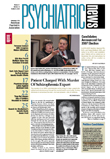A year after Hurricane Katrina devastated much of the Gulf Coast, mental health advocates have many good things to say about the short-term mental health response by federal health officials. They are, however, still waiting for plans and funding for a long-term response.
In the wake of hurricanes Katrina, Rita, and Wilma, officials with the Substance Abuse and Mental Health Services Administration (SAMHSA) stated that their goal was to ensure the ready availability of mental health and substance abuse assessments and crisis counseling for residents and evacuees of areas impacted by the storms.
Thanks to nearly $110 million in SAMHSA grants to support mental health services for hurricane victims, federal officials maintain that an unprecedented level of federal assistance was provided for recovery from psychiatric trauma.
“Most survivors of Katrina, Rita, and Wilma are demonstrating remarkable resiliency and are rebuilding their lives,” said Assistant Surgeon General Eric Broderick, D.D.S., M.P.H., acting deputy administrator of SAMHSA, in a press release describing the grants.
Additional SAMHSA goals included creating a longer-term plan to address posttraumatic stress disorder (PTSD) among hurricane survivors and ensuring that Gulf Coast residents with “serious mental illnesses and/or addictive disorders and children with serious emotional disturbances continue to receive ongoing treatment for their chronic disorders,” according to an agency statement.
Critics said that the agency was much less successful with these larger goals.
The agency's response to the hurricanes included making the SAMHSA Emergency Response Grants (SERG) available. These grants fund crisis mental health and substance abuse services when local resources are overwhelmed and other resources are unavailable. SAMHSA describes SERG as “funding of last resort,” because it was traditionally provided in rare emergency situations. These funds went to areas that the impacted states determined to be the areas of highest need and were allocated for clinical services including methadone treatment.
Another source of funds for the cash-strapped region was the Federal Emergency Management Agency's Crisis Counseling Grants and Crisis Counseling Training and assistance Program, which fund mental health assistance and training activities in federal disaster areas. The funds were available to states and Indian tribes. SAMHSA conducted 91,000 counseling sessions, according to agency officials, and referred 700 people to mental health, substance abuse, and social services.
Crisis-Counseling Funds
Critics questioned, however, why crisis-counseling funding was not used to restore the many services hurricane victims with serious mental illness lost.
“Large numbers of people receiving psychiatric care in hospitals or groups homes did not benefit from these programs,” Ron Hamburg, legal director of the National Alliance on Mental Illness (NAMI) told Psychiatric News.
Among the higher-profile, short-term SAMHSA efforts were two public service announcement (PSA) campaigns, which provided print, radio, and television ads to local media to encourage “individuals who may be experiencing psychological distress from last year's hurricanes to seek mental health services,” according to SAMHSA.
NAMI officials supported the PSA campaigns, but they were disappointed that the help they offered was limited to a referral to a toll-free national help line.
In a speech in May on the post-hurricane federal mental health response, Charles Curie, M.A., former SAMHSA administrator, defended the PSA campaigns as a way the agency was able to work with limited funding to encourage those in need of mental health care at least to seek help.
Long-Term Effort Fell Short
Critics of the federal response said the short-term effort was positive, but SAMHSA's longer term approach—despite its stated goals to address PTSD and other long-term problems—comes up short.
“What that represents is the failure to foresee the longer mental health needs—that trauma, which is by definition long term,” Ralph Ibson, vice president for government affairs at the National Mental Health Association, told Psychiatric News.
SAMHSA officials have described in the months since the hurricanes that the previous research on the mental health consequences of such traumatic events found extensive and long-lasting psychological effects. Agency officials noted that individuals' distress over the loss of possessions, homes, and communities was often exacerbated by the loss of loved ones and the pain of destruction and violence.
Despite the agency's concerns about the long-term mental health consequences of the disasters, it was unable to secure sufficient federal funding to provide this type of care.
Critics noted that federal officials made little mention of the fact that the storms exacerbated existing mental illness among the many adults and children in the region. The mental health systems in several Gulf Coast states were overwhelmed, and Hamburg and others described these systems as“ woefully underfunded” even before the storms. But little federal assistance was directed toward the restoration of these systems of care.
Federal officials countered that SAMHSA has provided some funding for grant programs that help localities rebuild their mental health “service delivery systems.”
One such grant awarded in June to Louisiana and Mississippi provides a total of $2.4 million over three years to rebuild their youth suicide prevention programs.
“These grants will enable two of the hardest-hit states to reach out to young people who are still having serious problems coping with the devastating effects of the hurricanes on their lives.” SAMHSA's Broderick said.
One effort that mental health advocates hope will bear fruit is a federal plan to amend Medicare and Medicaid to better support improved access and quality of health care for the poor and aged in the region. Federal officials supported the creation of the Louisiana Health Care Redesign Collaborative, for instance, which hopes to present its blueprint for redesign by October.
More information on SAMHSA's postdisaster efforts in the Gulf states is posted at</www.samhsa.gov/Speeches/katrina052206.aspx>.▪


